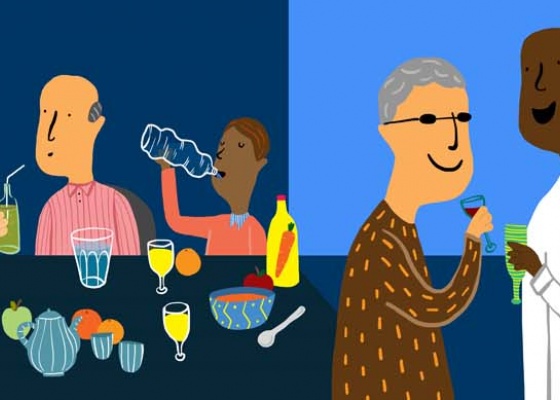Water makes up over two-thirds of the healthy human body. It lubricates the joints and eyes, aids digestion, flushes out waste and toxins, and keeps the skin healthy.
Dehydration occurs when your body loses more fluid than you take in.
When the normal water content of your body is reduced, it upsets the balance of minerals (salts and sugar) in your body, which affects the way it functions. The body is affected even when you lose a small amount of fluid.
Most of the time, we can prevent dehydration by drinking regularly throughout the day. Be guided by your thirst, but be aware that in hot weather, when exercising and during illness, you should drink more. As we age, we also start to naturally feel less thirsty so it’s important to keep an eye on how much you’re drinking throughout the day.
Look out for some of the early warning signs of dehydration:
- Feeling thirsty, lightheaded, tired and confused – this could lead to becoming unsteady on your feet with an increased risk of tripping or falling.
- Dry mouth, lips and tongue leading to crusty and cracked mouth.
- Passing urine less often than usual. This can lead to urinary infections and incontinence, or in some cases long-term kidney problems.
- Constipation – lack of fluid intake is a common cause of constipation.
Practical steps to help yourself:
- Drink 6-8 cups of fluid every day (this is about 1.5 litres or 2.5 pints). All hot and cold drinks count towards hydration.
- Make sure that you have the time and fluids available that you enjoy.
- Drink little and often, taking small sips, if you find it a challenge to drink a whole glass in one sitting.
- Make sure you are in the correct position to drink.
- Make sure that you have the right cups and accessories available, such as straws and bottles or maybe a hydration device.
- If you are worried about getting up in the night for the loo, don’t drink alcohol or caffeine close to bedtime. Ask your pharmacist if any medications you are taking could be causing you to need to use the loo more at night - perhaps changing when you take your medication could help.
- If you regularly cough and splutter when you drink, have a chat with a health care professional – there are things that can help.
- Try to eat foods with a high water content; for example, fruit and veg, stews and soups, milk based puddings, jelly, ice cream, yoghurt and custard
Working with and for care home staff during a pandemic - Top Tips for Tricky Times

